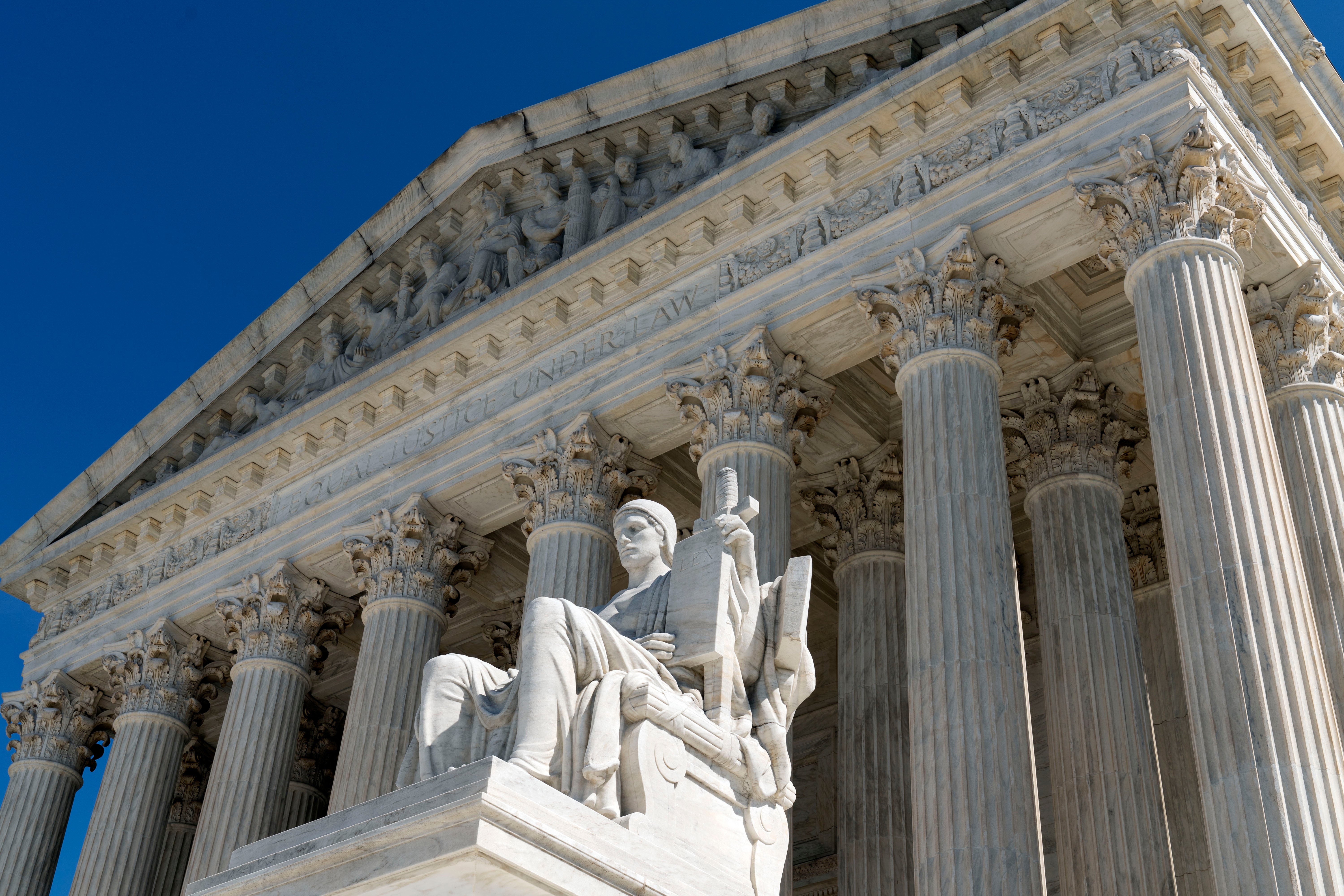The Independent's journalism is supported by our readers. When you purchase through links on our site, we may earn commission.
The Supreme Court is taking on some very controversial cases this term
From LGBTQ rights to affirmative action, the radically conservative court is taking on cases that should give all of us pause


Your support helps us to tell the story
From reproductive rights to climate change to Big Tech, The Independent is on the ground when the story is developing. Whether it's investigating the financials of Elon Musk's pro-Trump PAC or producing our latest documentary, 'The A Word', which shines a light on the American women fighting for reproductive rights, we know how important it is to parse out the facts from the messaging.
At such a critical moment in US history, we need reporters on the ground. Your donation allows us to keep sending journalists to speak to both sides of the story.
The Independent is trusted by Americans across the entire political spectrum. And unlike many other quality news outlets, we choose not to lock Americans out of our reporting and analysis with paywalls. We believe quality journalism should be available to everyone, paid for by those who can afford it.
Your support makes all the difference.Last month, Chief Justice John Roberts expressed a desire to return to normal. In remarks to an audience in Colorado, Roberts mused, “I think the more normal, the better.” Unfortunately, none of this is normal.
In a normal reality, perhaps today we’d be primarily celebrating the historic term of the first Black woman Supreme Court Justice, Ketanji Brown Jackson. Instead, Americans are fearfully staring down the barrel of another Supreme Court term packed with consequential cases that could deliver disastrous results as radical as its 6-3 majority.
Chief Justice Roberts’ yearning for normalcy comes at a time when public trust and approval of the Supreme Court is at a historic low, dropping 20 points in just the past two years. Rightfully so. Americans are still reeling from the Dobbs v. Jackson decision that overturned Roe v. Wade using archaic thinking and ancient laws as justification in an absolutely unhinged opinion written by Justice Alito. By rolling back women’s reproductive rights that were relied on for 50 years, the Supreme Court unleashed chaos. Red states began implementing abortion bans, clinics shut down, and gruesome stories circulated of forced pregnancies in the most dire of circumstances.
While this isn’t normal, it certainly wasn’t an accident. What we’re witnessing is the culmination of decades of conservative judicial maneuvering. The conservative movement systematically backed a pipeline of judges that they knew would push their radical agenda. With the nomination and confirmation of Justices Neil Gorsuch, Brett Kavanaugh, and Amy Coney Barrett during the Trump administration, conservatives are well-positioned to continue their extreme right-wing crusade.
The cases on the docket this term will have significant impacts on democracy, human rights, the environment, and the administrative process of government as we know it. Let’s take a look at some of the most important ones.
Voting Rights
The Case: On Tuesday, the Supreme Court will hear arguments in its first big voting rights case of the term, Merrill v. Milligan. The court will rule on whether or not Alabama’s 2021 redistricting maps violated Section 2 of the Voting Rights Act. Section 2 protects against election rules that discriminate on the basis of race. The new map only drew one majority-Black congressional district, in spite of the fact Black people make up 27 percent of the state’s population.
A lower court ruled that this practice likely violated Section 2 and ordered Alabama to draw up a second majority-Black district. Alabama Republicans appealed this ruling to the Supreme Court, who obliged, put the lower court ruling on hold in February, and placed the case on the 2022 docket.
The Context: Voting rights advocates are worried the court will likely rule in favor of the Alabama Republicans’ arguments that drawing another majority-Black district would not be “race-neutral.” That fear is justified. AFiveThirtyEight analysis of Supreme Court voting rights cases since 1965 found that these cases have increasingly ruled in favor of conservatives in recent decades. One case, in particular, stands out as a bellwether. It was also in Alabama.
In 2013, Chief Justice Roberts led the infamous 5-4 ruling in the Shelby County v. Holder case that gutted a key part of the Voting Rights Act. The ruling ended the process of pre-clearance and allowed nine southern states, including Georgia, to change their voting laws without federal approval. In the majority opinion, Chief Justice John Roberts wrote: “Our country has changed.” The results of that decision clearly proved that our country hasn’t changed nearly enough.
The Impact: This is a matter of equal representation. Immediately after the 2013 ruling, red states began to push discriminatory voter laws that disproportionately impact Black voters. If the Supreme Court rules in favor of Alabama Republicans in this case, we would see even further erosion of voting rights across the country with increasingly racial gerrymandered maps and more blatantly discriminatory election laws that were previously prohibited in Section 2 of the Voting Rights Act.
The results of this would be less Black voter representation, which will lead to more Republican-leaning districts and give the GOP more tools to voter suppress and engineer minority rule.
Election Subversion
The Case: Moore v. Harperis among the most concerning cases. While this case doesn’t have a scheduled hearing yet, it is on the docket for this term. The case deals with a lower court decision that struck down a North Carolina redistricting map for partisan gerrymandering. Republican legislators appealed the decision to the Supreme Court arguing the “independent state legislature doctrine” legal theory.
Republicans are arguing that state legislatures have absolute, unchecked authority to regulate how their states conduct federal elections. They claim they aren’t bound by state constitutions or judicial review.
The Context: This ruling could be incredibly consequential, given a key component of Donald Trump’s effort to overturn the 2020 election involved weaponizing state legislatures. The Trump campaign pushed a fake elector scheme that relied on GOP legislatures to overturn the will of the voters. Luckily, there were no legal avenues to do this at the time, but a Moore v. Harper ruling like this could pave the way for state legislatures to pursue more nefarious tactics.
The Impact: If North Carolina Republicans win this case, Republican legislatures across the country could be freed up to more aggressively gerrymander along partisan lines, enforce voter suppression tactics unchecked by their state executive and judiciary branches, and — most dangerously — they could attempt to subvert elections. If this legal theory was in effect before January 6, this would’ve given Trump more tools in his coup attempt.
This ruling could also increase the urgency for Congress to pass meaningful voting rights and election reform laws. The case will have major implications for 2024, depending on how SCOTUS rules.
Affirmative Action
The Cases: There are two cases currently on the docket dealing with Affirmative Action, Students for Fair Admissions v. Harvard College and Students for Fair Admissions, Inc. v. University of North Carolina. Both cases seek to end the practice of considering race as a factor in college admissions. The cases seek to overturn Grutter v. Bollinger, a 2003 case that upheld affirmative action as a means to bolster diversity in the college admission process.
The Context: In 2007, Chief Justice Roberts made relevant comments on this issue in a plurality opinion for a case that ruled a school district couldn’t use race as a factor when placing kids in high schools. Roberts wrote: “The way to stop discrimination on the basis of race is to stop discriminating on the basis of race.” This stance will likely inform Roberts’ opinion on affirmative action and issues of voting rights.
The Impact: Chief Justice Roberts appears to repeatedly equate a measure that seeks to end discrimination as a form of discrimination itself. If affirmative action is ended, we may see diversity in universities with histories of elitist practices continue to be elusive.
The Environment
The Case: On Monday, the Supreme Court began hearing arguments in the Sackett v. Environmental Protection Agency case. The case seeks to limit the EPA’s ability to regulate wetlands.
The Context: This case comes after the Supreme Court eroded the EPA’s ability to regulate greenhouse gasses in a June 30 ruling this year.
The Impact: A ruling against the EPA could exclude over 51 percent from the Clean Water Act’s protections. Vox claimed that a ruling in favor of Sackett could “prove to be the most significant attack on America’s clean water laws since the 1970s.” Less regulation would mean more pollution and exacerbated climate change effects. This ruling would certainly fire up progressives.
LGBTQ Rights
The Case: The Supreme Court has decided to take up yet another contentious case in 303 Creative LLC v. Elenis. The case involves a Colorado designer who is seeking to post a statement on her website proclaiming that she is taking a “religious” stance not to do designs for same-sex marriages. This is against discrimination laws in Colorado. The Supreme Court will determine whether Colorado is violating the First Amendment.
The Context: A similar case was ruled on in 2018 when a baker refused to bake a wedding cake for a same-sex couple. In a 7-2 ruling, the Supreme Court ruled in favor of the baker.
The Impact: At a moment when Justice Clarence Thomas has recently signaled in the Dobbs decision that he believes issues like a same-sex marriage repeal are on the table, a ruling like this would certainly strike fear into the LGBTQ community.
Minority Rule By Decree
There are of course many other cases the Supreme Court is taking up this term. Just today, SCOTUS agreed to take up a case that could modify Section 230 and increase the legal liability of social media companies for what is said on their platforms.
Overall, the human toll of the Supreme Court decisions I listed would be devastating. And as we’ve seen in polling after the Roe repeal, the political fallout will continue backfire on conservatives as these unelected justices legislate from the bench. It would be one thing if these rulings represented the majority of Americans, but they do not. This is minority rule by decree.
Just like the Roe v. Wade decision changed the political dynamics of the 2022 midterms, the decisions that come out of this term will reverberate far beyond the courtroom. Regardless of the political ramifications, one thing is for certain: the consequences of this Supreme Court term will be felt for decades.
Join our commenting forum
Join thought-provoking conversations, follow other Independent readers and see their replies
Comments